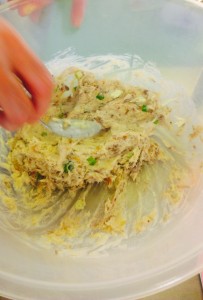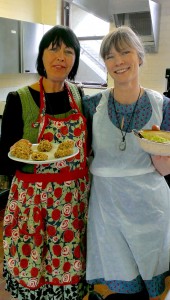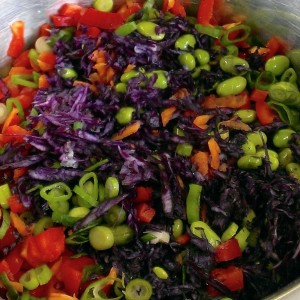On the first Tuesday of each month I run a small but dedicated Food For Thought Group at the Lighthouse Recovery Centre together with Community Recovery Worker, Lesley Rhodes, and the centre’s food support staff and members
The Lighthouse is a referral only service that supports people with a personality disorder living in Brighton and Hove. It is a joint partnership between Sussex Oakleaf, Sussex Partnership Foundation Trust and Brighton and Hove Mind and is open for members 7 days a week.
The Food For Thought group is just one of many activities available to its members. We explore the health properties of particular foods and then try them out in different recipes.
The aim is not only to appreciate just how diverse and nourishing foods can be, but also to develop practical cooking skills through hands on experience – and to gain confidence preparing and eating unfamiliar ingredients. For example, in January’s workshop we focused on fennel (both bulb and seeds) and in February, we embraced the adaptable aubergine.
Workshops are held in the Lighthouse kitchen, which is a warm, bustling and friendly environment – usually filled with laughter, genial witticisms and delicious smells.
For me, this is the ideal setting in which to prepare food, as it feels more like a social event than a chore! Cooking and chatting together transforms what can often be seen as drudgery, into something fun and rewarding.
As well as the obvious advantage of strengthening social ties, the workshops are also designed to foster an awareness of nutrients crucial for optimal physical and mental health, i.e. health self-empowerment.
Educating people about nutrition and cooking skills can influence food related behaviour, as well as health (1,2,3). Fostering awareness about how the body works, for example the link between balanced blood sugar levels and emotional stability, or the crucial role of the liver, can also help nudge individuals towards making healthier food choices in their daily lives.
And while there are no empirical studies looking at the relationship between nutrition and personality disorder, there is abundant evidence that nutrition and eating behaviour impact not only affective regulation (mood and emotion) (4-9) but also conative (motivation, intention, self-control) (10-12) and cognitive processes (13-15) .

The emphasis is on simple, healthy and tasty – Smoked Mackerel Pate with horseradish and spring onions
The Food For Thought Group also offers a safe environment in which to explore individual challenges with food that may have developed in childhood, such as food or texture aversions or fear of specific foods, without any expectation or pressure to share personal experiences – or indeed to cook!
Members can drop in (or out) of the group as they please, though they might well be tempted back by the mouthwatering aromas and entertaining kitchen banter.
References:
- Hartmann, C., Dohle, S., & Siegrist, M. (2013). Importance of cooking skills for balanced food choices. Appetite, 65, 125-131.
- Harmon, B. E., Smith, N., Pirkey, P., Beets, M. W., & Blake, C. E. (2015). The Impact of Culinary Skills Training on the Dietary Attitudes and Behaviors of Children and Parents. American Journal of Health Education, 46(5), 283-292.
- Clark, A., Bezyak, J., & Testerman, N. (2015). Individuals with severe mental illnesses have improved eating behaviors and cooking skills after attending a 6-week nutrition cooking class. Psychiatric rehabilitation journal, 38(3), 276.
- Holt, M. E., Lee, J. W., Morton, K. R., & Tonstad, S. (2015). Trans fatty acid intake and emotion regulation. Journal of health psychology, 20(6), 785-793.
- Bushman, B. J., DeWall, C. N., Pond, R. S., & Hanus, M. D. (2014). Low glucose relates to greater aggression in married couples. Proceedings of the National Academy of Sciences, 111(17), 6254-6257.
- Jackson, D. B. (2016). The link between poor quality nutrition and childhood antisocial behavior: A genetically informative analysis. Journal of Criminal Justice, 44, 13-20.
- Pina-Camacho, L., Jensen, S. K., Gaysina, D., & Barker, E. D. (2015). Maternal depression symptoms, unhealthy diet and child emotional–behavioural dysregulation. Psychological medicine, 45(09), 1851-1860.
- , , , , , , , , & (2013). Maternal and early postnatal nutrition and mental health of offspring by age 5 years: a prospective cohort study. Journal of the American Academy of Child and Adolescent Psychiatry 52(10): 1038–1047
- , , & (2012). Moving towards a population health approach to the primary prevention of common mental disorders. BMC Medicine 10(1): 149.
- Gailliot, M. T., & Baumeister, R. F. (2007). The physiology of willpower: Linking blood glucose to self-control. Personality and Social Psychology Review, 11(4), 303-327.
- Tan, C. C., & Holub, S. C. (2015). Emotion Regulation Feeding Practices Link Parents’ Emotional Eating to Children’s Emotional Eating: A Moderated Mediation Study. Journal of pediatric psychology, 40(7), 657-663.
- Berland, C., Cansell, C., Hnasko, T. S., Magnan, C., & Luquet, S. (2016). Dietary triglycerides as signaling molecules that influence reward and motivation. Current Opinion in Behavioral Sciences.
- Bellisle, F. (2004). Effects of diet on behaviour and cognition in children. British Journal of Nutrition, 92(S2), S227-S232.
- Lucassen, P. J., Naninck, E. F., van Goudoever, J. B., Fitzsimons, C., Joels, M., & Korosi, A. (2013). Perinatal programming of adult hippocampal structure and function; emerging roles of stress, nutrition and epigenetics. Trends in neurosciences, 36(11), 621-631.
- Morley, J. E. (2014). Cognition and nutrition. Current Opinion in Clinical Nutrition & Metabolic Care, 17(1), 1-4.
- Walker, J. G., Batterham, P. J., Mackinnon, A. J., Jorm, A. F., Hickie, I., Fenech, M., … & Christensen, H. (2012). Oral folic acid and vitamin B-12 supplementation to prevent cognitive decline in community-dwelling older adults with depressive symptoms—the Beyond Ageing Project: a randomized controlled trial. The American journal of clinical nutrition, 95(1), 194-203.





